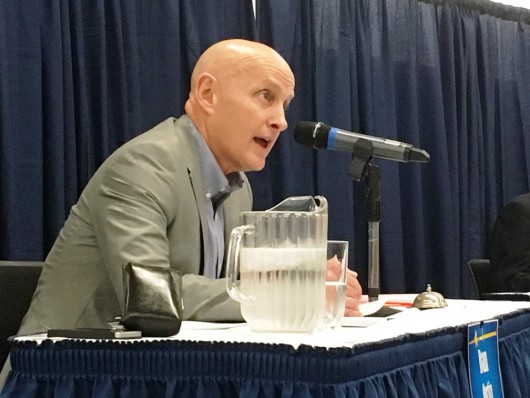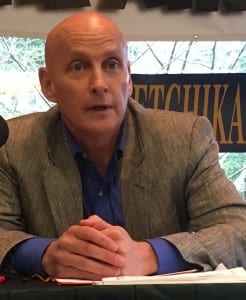House District 36 Rep. Dan Ortiz gave a presentation Monday to the Ketchikan Gateway Borough Assembly, fielded questions and heard some advice and concerns from Assembly members.
As Rep. Ortiz prepares for the upcoming legislative session, he’s talking with local residents and government officials about what they’d like to see him work on while in Juneau.
In his presentation to the Ketchikan Borough Assembly, Ortiz started with some thoughts on a recent resolution that the Assembly approved regarding ways to improve the equity of education funding across the state.
The borough sued the state over the constitutionality of the required local contribution; and while Ketchikan won in Superior Court, it lost on appeal to the state Supreme Court. Ortiz noted that there might be a way to make progress through legislative action, instead.
“I contacted Darwin Peterson, who is the legislative liaison for the governor and talked to him about the idea of adding to an existing, or not to an existing but to a potential income-tax bill, some language which might be one way that we could address this disparate situation that we’re in right now,” he said.
Ortiz said the language he suggested would be an increase to a statewide income tax, but anyone living in a community that provides a local contribution to schools then would receive a credit for that portion of the income tax.
“Thereby, the added tax would be in essence be put upon by those folks not currently paying a local contribution,” he said.
Only communities in organized parts of the state – boroughs and first-class cities with their own school districts – are required to provide a prescribed amount of local school funding.
own school districts – are required to provide a prescribed amount of local school funding.
Ortiz said the governor’s office is looking into the legality of his idea, and if it passes that test, will bring the suggestion to Gov. Bill Walker for consideration.
Assembly Member Glen Thomson asked whether Ortiz would be willing to instead introduce a bill that would require unorganized parts of the state to form boroughs. Ortiz responded that he’d be open to talking about that, but wasn’t ready to commit.
Ortiz also talked about his concern about potential attempts by state lawmakers to make budget cuts that would then pass costs down to local governments. He said he’ll work against any such proposals.
The state was hit by a major deficit several years ago when oil prices dropped, because that meant oil tax revenue dropped. The state already has cut spending. Ortiz said there will be more cuts, but:
“It’s going to be hard to reduce the budget further without taking some money from education, without taking money from Health and Human Services, because those are the big areas where we’re spending money in terms of the biggest cost areas of the budget,” he said.
In terms of revenue, Ortiz said that after making some more spending cuts, the state eventually will need to use at least some of the Alaska Permanent Fund earnings in conjunction with some kind of new taxes.
He said he understands people don’t like taxes, and that taxes mean less discretionary spending.
“But the reality also is that we can’t keep doing what we’re doing,” he said. “Because we’re going to run out of savings, so that’s not an alternative. So, we have to decide: Do we really, really want to cut the budget so much that we have a lot, lot less for education and Health and Human Services, or do we want to pay for some of those things and do it by way of some taxes.”
After his presentation, Ortiz heard some input. Assembly Member Rodney Dial said more budget cuts – not just deferrals — must happen before the state implements any new taxes. And, he said, if there is a tax it should be a sales tax rather than an income tax.
Dial also complained that costs often are passed on to urban Alaska, and should be more fairly shared by the rural parts of the state. He specifically suggested looking at cuts to Medicaid and welfare benefits, and to the Alaska Village Public Safety Officers program.
“The state pays 100 percent of the VPSO salary, outfits the individual with state funds, trains the VPSO at the state academy, supervises the VPSO daily with other state employees, dispatches the VPSO and even has state employees write their police reports,” he said. “And then, on top of all that, the State of Alaska gives the community managing the VPSO a 25-28 percent indirect rate on top of that.”
Assembly Member Thompson had a suggestion if the state does move forward with an income tax.
“ And that’s for you guys to consider allowing people, individuals, to opt out of the Permanent Fund Dividend as a tax credit against a state income tax,” he said.
That way, Thompson said, those individuals’ overall incomes would be lower, which would in turn lower their individual federal income tax, while still helping to pay for state services.
Ortiz said there is a proposal along those lines from Homer Rep. Paul Seaton, and it does have support from other lawmakers.
The 30th Alaska legislative session begins on Jan. 17.







